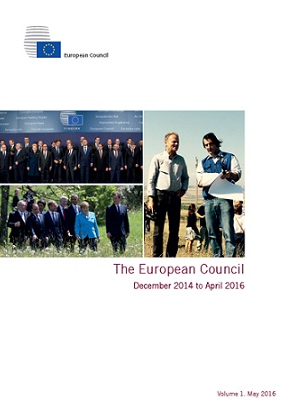Hernández, Enrique, Kriesi, Hanspeter, (2016), “The electoral consequences of the financial and economic crisis in Europe”, European Journal of Political Research, Μay The electoral consequences of the Great Recession are analysed in this article by combining insights from economic voting theories and the literature on party system change. Taking cues from these two theoretical perspectives, the impact of the Great Recession on the stability and change of Western, Central and Eastern European …Read More
The European Council: December 2014 to April 2016
European Council, (2016), “The European Council: December 2014 to April 2016”, European Council, Volume 1. May 2016 The European Council faced critical political challenges from December 2014 to April 2016. These included unprecedented flows of asylum seekers and irregular migrants, the need to prevent the exit of Greece from the eurozone and the imperative to find a new settlement for Britain ahead of an In/Out referendum on EU membership. European leaders …Read More
EU Austerity And The Brain Drain From The South
Labini, Francesco Sylos, (2016), “EU Austerity And The Brain Drain From The South”, Social Europe, 10 Μay The debate on the sustainability of the European single currency seems to have focused exclusively on the requirement that EU member states comply with the macro-economic financial parameters established by the dictates of austerity policies. The absence of any collective reflection on how to boost structural economic development is astonishing at a time when …Read More
The European Union remains a laggard on banking supervisory transparency
Gandrud, Christopher, Hallerberg, Mark, Véron, Nicolas, (2016), “The European Union remains a laggard on banking supervisory transparency”, Bruegel, 10 Μay Supervisory transparency, or the publication by prudential supervisors of data about the institutions they supervise, is an essential tool to ensure market discipline in the banking sector and thus supports the public-policy objective of financial stability, in complement to disclosures made by the banks themselves. In the European Union, we find that the already …Read More
Double bank runs, liquidity risk management, and Basel III
Ippolito, Filippo, Peydró, José-Luis, Polo, Andrea, Sette, Enrico, (2016), “Double bank runs, liquidity risk management, and Basel III”, Voxeu, 10 Μay By providing liquidity to credit line borrowers and depositors, banks are potentially exposed to simultaneous runs on their assets and liabilities. This risk became a reality when the European interbank market froze in the summer of 2007. This column discusses the risk of double-bank runs, liquidity risk management by banks and the implications …Read More
Temporary Agency Work and the Great Recession
Baumgarten, Daniel, Kvasnicka, Michael, (2016), “Temporary Agency Work and the Great Recession”, IZA DP No 9913, April 2016 We investigate with German data how the use of temporary agency work has helped establishments to manage the economic and financial crisis in 2008/09. We examine the (regular) workforce development, use of short-time work, and business performance of establishments that made differential use of temporary agency work prior to the crisis. Overall, our results …Read More
Market Reforms in the Time of Imbalance
Cacciatore, Matteo, Duval, Romain, Fiori, Giuseppe, Ghironi,Fabio, (2016), “Market Reforms in the Time of Imbalance”, CEPR DP11247, April 2016 We study the consequences of product and labor market reforms in a two-country model with endogenous producer entry and labor market frictions. We focus on the role of business cycle conditions and external constraints at the time of reform implementation (or of a credible commitment to it) in shaping the dynamic effects of …Read More
The Cost of Non-Schengen for the Single Market
Deringer, Hanna, (2016), “The Cost of Non-Schengen for the Single Market”, European Centre for International Political Economy, Μay A suspension of the Schengen Agreement would damage the European economy, in particular by undermining the European single market. And it would not just damage the movement of people and labour in Europe. Several studies show that the Schengen Agreement also eases the free flow of goods, services, and capital. Suspending Schengen would …Read More
Pressured budgets and the European Commission: towards a more centralized EU budget administration?
Goetz, Klaus H., Patz, Ronny, (2016), “Pressured budgets and the European Commission: towards a more centralized EU budget administration?”, Journal of European Public Policy, 22 Αpril Similar to many international public administrations (IPAs), the European Commission has been delegated a range of tasks related to budgeting. The Commission administration enjoys a high degree of autonomy in routine annual budget procedures leading to the adoption of the draft annual EU budgets; it also has a …Read More
Unemployment Is Down, but Unworked Hours Are Still High
Buffie, Nick, (2016), “Unemployment Is Down, but Unworked Hours Are Still High”, Center for Economic and Policy Research, 5 Μay This Friday morning, the Bureau of Labor Statistics will release the latest jobs figures for the month of April. The unemployment rate and the number of jobs created will likely be the major focuses of most reporting. But there is an important and less noticed problem in today’s economy. Specifically, the weakness of …Read More





